We've been hearing all year that the "analytics" say that going for it on 4th and short situations results in (on average) more points and more wins, compared to punting or kicking a field goal. The fad for the past few years has been for teams to more frequently attempt to convert 4th and short situations, even when they are not in "comeback mode". More and more teams are refusing to punt the ball from inside the opponent's 50 yard line, or to kick chip shot field goals from within the opponent's 5. So far, this has been working out for teams more often than it has back-fired.
I've been a vocal opponent of these overly-aggressive play calls throughout the entire season, and have been insisting that these decisions are going to start to bite teams in the ass. That finally happened in the NFC Championship game, when the Detroit Lions found out the hard way that maybe they should have just taken the points.
The Lions refused to kick field goals on 2 separate occasions in the 2nd half. On both occasions, they failed to convert the 4th down. They left 6 points on the board, and they ended up losing the game (and their hopes of going to the SuperBowl) by 3 points.
In the 3rd quarter, after the Lions left the first 3 points on the board, I told the people watching the game with me that I thought this was the wrong move. The 49ers had scored a field goal with their first possession of the 2nd half to reduce the Lions' halftime lead from 17 to 14. Had the Lions simply kicked the field goal (and made it), they would have kept parity with the 49ers and maintained their 3-score lead. When they opted to leave the 2nd 3 points on the board, the Lions were only down by 3. That field goal would have tied the game, or it would have taken the lead if the Lions had already made the previous field goal.
The Lions left 3 points on the field twice, and lost the NFC Championship against the 49ers by 3 points.
The Lions lost the NFC Championship because their coach, Dan Campbell, dogmatically obeyed the analytics. I would have hoped that Dan Campbell would have learned this lesson after the failed 2-point conversion shenanigans against the Cowboys that cost the Lions the number 1 overall seed. But he didn't. He doubled-down. They lost out on the opportunity to host the NFC Championship game, which probably would have made all the difference for them. And now they've lost their chance at going to the SuperBowl.
[More]
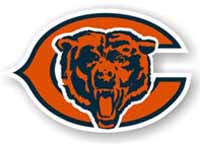
The NFL regular season has ended. Teams are starting their annual fire sales on coaches and coordinators. Some of the early casualties include Patriots' head coach Bill Belichick, Chargers' head coach Brandon Staley, Washington Commanders' head coach Ron Rivera, Chicago Bears' offensive coordinator Luke Getsy, and others. That's on top of mid-season firings of Raiders' head coach Josh McDaniels and Carolina Panthers' head coach Frank Reich. During the second half of the season, speculation about which coaches would get fired was accompanied by fans arguing over whether these bad teams were "tanking" the season (or should tank the season) to improve their draft picks. The Bears were one of the most talked-about teams in this regard.
I don't pretend to know what goes on behind closed doors in NFL front offices, and no NFL front office has ever (to my knowledge) actually come out and said "we're deliberately tanking this season", so whether or not a team might be tanking is pure speculation. But if you ask me, no professional sports team should ever deliberately tank a season! And this goes double for any team that is operating with a 1st or 2nd year coaching staff or general manager, as is the case for the 2022 and 2023 Chicago Bears.
Many fans speculated (and even wanted) that the Bears would tank in 2022. And after a 1-5 start to the 2023 season, some fans even began to think the Bears were tanking this season too. Reddit was awash with posts insisting that the Bears' should tank in order to get the top 2 picks in the 2024 NFL draft (the Bears own the Panther's first round pick, in addition to their own pick). This would allow the Bears to cut Justin Fields and draft Caleb Williams, as well as get some other top-tier elite talent.
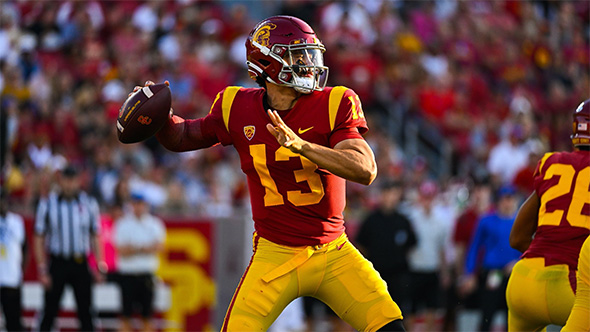 Photo credit: John McGillen, Photography LLC.
Photo credit: John McGillen, Photography LLC.
Many fans expect the Bears to cut or trade Justin Fields in order to draft Caleb Williams.
Personally, I am willing to go on the record as saying that I do not agree with this popular consensus that the Bears should draft Caleb Williams. I am still on the fence about Justin Fields' potential, and would like to see him stay with the team. I would prefer that the Bears trade down to get more draft capital, and focus on taking an elite receiver (Marvin Harrison Jr.), offensive lineman, pass rusher, and/or cornerback. But my feelings on the Bears' specific 2024 strategy is neither here nor there. The main point is that regardless of the Bears' plans with Justin Fields (or any teams' plans with any roster), no team should ever deliberately tank a season.
The thing about tanking is that "tanking" is practically indistinguishable from actually sucking.
[More]
1f286c63-4235-46c0-9549-908588ac029c|0|.0
Tags:Chicago Bears, football, NFL, draft, Caleb Williams, Matt Eberflus, Ryan Poles, Luke Getsy, Justin Fields, Marvin Harrison Jr., tank, playoff, Ki-Jana Carter, Kenneth Sims, Tim Couch, Gale Sayers, Andrew Luck, injury
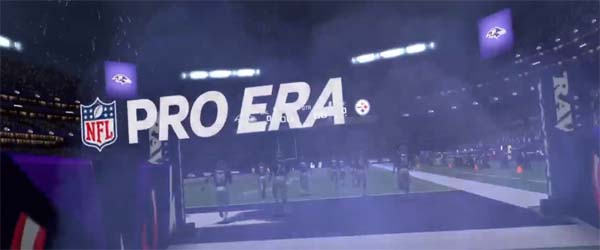
When I first saw that there was an NFL-licensed VR game, I assumed it was developed by EA and associated with Madden. After all, EA owns the exclusive rights to NFL-licensed "simulation" football games. I downloaded the playable demo expecting that first-person VR football would be a nauseating disaster of a game. But much to my surprise, the demo was not bad. And doubly-surprising, it isn't developed by EA either. It's developed by StatusPro, inc., which is a company that has made VR training tools for actual athletes, and which is now testing out the waters of VR sports video gaming.
So I guess this is a second loophole to EA's NFL "exclusivity". Not only can other companies make "non-simulation" NFL games, but apparently, VR games are not covered by EA's exclusivity, regardless of whether the VR game could be considered "simulation" or not. NFL ProEra definitely falls into the camp of "simulation" as far as I'm concerned. I mean, what could be more "simulation" than an immersive VR game? Or is it "not simulation" because it lacks a multi-season Franchise mode?
Anyway, the demo was pretty hard. I'm used to reading defenses from a bird's-eye view as both a football spectator and video gamer, so I had a lot of trouble reading the defense from ground-level. I also struggled a bit with aiming my throws. I figured that if the offenses and defenses are using actual football concepts in their A.I., then I should be able to learn to read the defense with enough practice, and the control seemed responsive enough that I hoped I could eventually get used to the throwing motion. So I went ahead and dropped $30 for the full game, curious to see how robust and complete of an NFL experience it would provide.
I was expecting VR football to be a nauseating disaster, but it's surprisingly fun and engaging.
Then I was pleasantly surprised for the second time. I fully expected that the game would just be a collection of short scenarios and mini-games. You know, some "throw the ball through swinging tires" kind of things to practice or warm-up, followed by a short scenario in which I'd have to lead a two-minute drill to win some games. But that isn't the case. After the tutorial, I jumped into an exhibition game to wet my feet, and there was a whole football game there! ProEra even comes packaged with options for quarter length and game clock run-offs (e.g. an "accelerated clock", in Madden parlance). So I could even play a full-length, 15-minute quarter match if I wanted to. And yes, there's training camp mini-games and practice modes too! A couple of those mini-games will even be familiar to long-time Madden veterans.
So yeah, NFL ProEra actually does offer a reasonably complete and robust virtual NFL quarterback experience. But right there, in that sentence, is the first big caveat. You can only play as a quarterback. So if you were hoping to get to live out a VR career as a running back, receiver, or linebacker, you're out of luck -- let alone if you're one of the weirdos who dreams of being a punter, place-kicker, or longsnapper.
Some of the mini-camp drills will be very familiar to older Madden veterans.
[More]

After the end of the NFL season, I was expecting (and hoping) for the Bears to prioritize taking an offensive tackle or a wide receiver. Those were the 2 weakest spots on the offensive, and the things that would help Justin Fields the most. Defense was also problematic, and I would have been fine with a defensive pick. But I wasn't hoping for any particular defensive pick because the defense was just kind of bad on the whole, and there wasn't really 1 or 2 positions that could single-handedly fix the defense. The defense would need a lot of work in free agency as well.
But then the Bears made some free-agency moves that changed things. The first was trading away the top overall pick to the Panthers in exchange for DJ Moore. That filled the wide receiver need, and Darnell Mooney can go back to a secondary or slot role, where I think he will do much better.
The Bears also traded David Montgomery to the Lions. This left them with an underwhelming backfield of Khalil Herbert, Trestan Ebner, and Darrynton Evans. Herbert could probably be a serviceable starter, but only in a rotational role. I was high on him when he was drafted, but I don't see him being a productive every-down back.
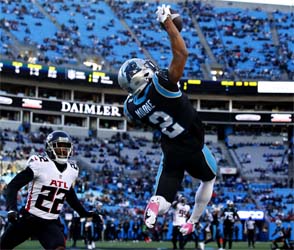 photo credit: Jared C. Tilton / Getty Images
photo credit: Jared C. Tilton / Getty Images
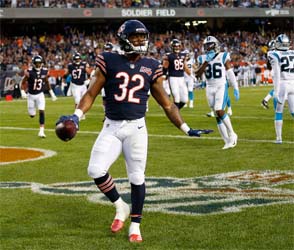 photo credit: Nuccio DiNuzzo / Getty Images
photo credit: Nuccio DiNuzzo / Getty Images
The Bears acquired receiver DJ Moore from Carolina, and traded David Montgomery to the Lions.
So considering that the defense needs a complete overhaul that couldn't be satisfied with just a single draft pick, and the offseason moves, my personal top two priorities for the Bears heading into the draft were running back and offensive tackle.
Another developmental tackle?
Even though the Bears did take an offensive tackle with their 1st-round pick, I was kind of disappointed by the pick. I was hoping for the Bears to take Peter Skoronski, the offensive tackle from Northwestern. He was the highest-rated offensive lineman in this draft class, the only offensive lineman who was a consensus top-15 pick, and the one who was considered the most "pro-ready" by scouts. And he was still available when the Bears went on the clock with the 10th overall pick
The Bears have been relying a lot on veteran free agents in their offensive tackle positions for years now, and have been repeatedly looking for young players to fill those positions long term. They tried drafting Teven Jenkins to play tackle, but he struggled at that position in his first year, was moved to guard, and has been doing well as a guard. Then they threw Braxton Jones into the fire of offensive tackle and traded for Alex Leatherwood from the Raiders to play the opposite tackle. Jones and Leatherwood were serviceable, but inconsistent. Jenkins, Jones, Leatherwood, and also reserve tackle Larry Borom have all proved to developmental projects.
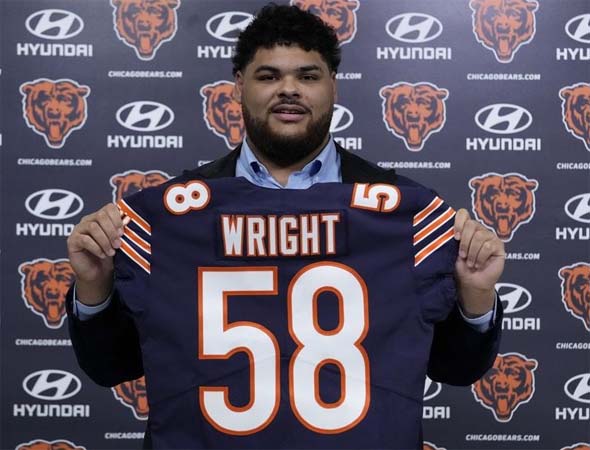 photo credit: Daily Herald
photo credit: Daily Herald
I wanted an offensive tackle, but Darnell Wright was not my preferred pick.
Instead of Skoronski, the Bears picked Darnell Wright from Tennessee. Wright is supposed to be a very good run blocker who will probably play right tackle. I fear that he's going to be more developmental when it comes to pass blocking. Unless the Bears find an elite veteran to fill the left tackle position, that position will be a battle between Braxton Jones, Alex Leatherwood, and Larry Borom. If one of them steps up and shows dramatic improvement from last year, then maybe Justin Fields' blindside will be well-protected. If not, Fields may find himself running for his life a lot in 2023, as he had to do in 2022.
[More]
18d4e73c-c3fa-460b-8b5b-e8a2fbdafdfa|4|2.0
Tags:Chicago Bears, NFL, football, draft, Bijon Robinson, Peter Skoronski, Darnell Wright, DJ Moore, David Montgomery, Roschon Johnson, Tyrique Stephenson, Tyler Scott, Teven Jenkins, Justin Fields, Braxton Jones, Alex Leatherwood, D'onta Foreman, Robert Tonyan
Philadelphia Eagles fans are apparently upset that the officials in SuperBowl XVII "decided the game" by calling a defensive holding on James Bradberry (Eagles DB) in the final minute of the game. The Chiefs were already well inside field goal range, so there was little question that they would score to break the tie. But this penalty on a 3rd down gave the Chiefs an automatic first down, and which allowed the Chiefs to run out the clock before kicking that game-winning field goal, thus, preventing the Eagles from having an opportunity to respond with their own scoring drive.
Yeah, sure, it always sucks when a penalty makes or breaks a game, but this was a reasonable penalty to call. We can debate all day whether the tug of the jersey was enough to impede the receiver's ability to run his route and get to the ball, or if the ball was even catchable to begin with. Either way, the tug of the jersey was obvious. By letter of the rule, it is a penalty. Case closed.
This slight tug of the jersey gave the Chiefs an automatic first down, to run out the clock on SuperBowl XVII.
While Eagles fans are upset by this one call, I'm more upset with the inconsistent rulings of the NFL officials throughout the entire 2022-2023 playoffs -- specifically where pass interference and defensive holding are concerned.
Earlier in the playoffs, the refs were apparently letting defenders get away with almost anything, supposedly on the grounds of "letting the players play". The refs were letting slide defensive actions that, in the regular season, would have been called as penalties. Even the commentators were talking about how the officiating tends to be a bit more lax in the playoffs because they don't want a penalty deciding the outcome of a playoff game. Even earlier in the SuperBowl, defenders on both sides got away with more flagrant fouls than the one that eventually decided the outcome of the championship. Heck, I don't think there is a single playoff team that doesn't have a grievance against the officiating in the playoffs -- whether they won the game or not.
So here's my question. (Or questions, I guess.) Are defensive holding and pass interference supposed to be penalties or not?!
[More]
|

| 12 | | | | | | | 60 | | 11 | | | | | | | 55 | | 10 | | | | | | | 50 | | 09 | | | | | | | 45 | | 08 | | | | | | | 40 | | 07 | | | | | | | 35 | | 06 | | | | | | | 30 | | 05 | | | | | | | 25 | | 04 | | | | | | | 20 | | 03 | | | | | | | 15 | | 02 | | | | | | | 10 | | 01 | | | | | | | 05 |
|